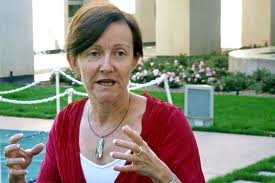Rachel Siewerts's Adjournment Address in the Senate yesterday to mark Close the Gap Day - Thursday 21 March 2013.
Thursday, 21 March—in other words, the day after tomorrow—is National Close the Gap Day. I would like to acknowledge all of those who have supported and participated in this event, which will happen around the country. However, the evidence is clear that there are still significant differences in health, education, employment and social outcomes between Aboriginal and Torres Strait Islanderpeople and other Australians. National Close the Gap Day is an important opportunity to promote awareness of these issues and take collaborative action towards improving the health and wellbeing of Aboriginal and Torres Strait Islander people. I note also that Close the Gap Day is a community owned initiative, whereas Closing the Gap is the government's program for addressing these issues. It may sound pedantic, but it is important to point out the difference between the two.
The Shadow report 2013: on Australian governments' progress towards closing the gap in life expectancy between Indigenous and non-Indigenous Australians (see below to read and/or download the report) outlines some progress in some areas, such as Indigenous child health. Although there has been some progress, unfortunately there is some plateauing in mortality rates in children under the age of five. There has been some progress in reducing the rates of smoking during pregnancy and increased attendance at antenatal care, at least once during a mother's first trimester. Early data indicates that the tackling Indigenous smoking and Indigenous Chronic Disease package initiatives are showing signs of being beneficial for adult health and life expectancy in the Indigenous population, which is very promising.
However, National Close the Gap Day serves as a reminder that there is still a very long way to go to close the gap between Aboriginal and Torres Strait Islanders and other Australians. Most Australian jurisdictions will not meet the Council of Australian Governments' target to achieve equality in life expectancy of Aboriginal and Torres Strait Islander people living in Australia by 2030. There has been an increasing trend of babies of low birth weight born to Aboriginal and Torres Strait Islander mothers. We know low birth weight is associated with later health problems, as well as a greater risk of mortality before the age of five. Funding cuts such as those reported in some states, such as New South Wales and Queensland, will have a potential detrimental effect on any efforts working towards closing the gap. There is also a need for further funding for the National Aboriginal and Torres Strait Islander Health Plan, which is funded until June this year, but as yet there has been no commitment of funds for the next five-year plan. This is absolutely essential.
One of the issues I have mentioned in this place before, and I believe it is absolutely essential if we are going to close the gap in Aboriginal health expectancy and life outcomes, is to ensure that we deal with otitis media, an ear infection characterised by fluid build-up in the middle ear. Unfortunately, if it is left untreated it results in hearing loss. A lot of work is going on in how to deal with combatting otitis media. I very strongly support that work and the funding for that work, but unfortunately this disease strikes so many Aboriginal and Torres Strait Islander people, particularly when they are babies. Babies as young as three months old can get otitis media. In some communities, up to 90 per cent of babies are affected by otitis media. So not only do we need to put in the effort to treat and eradicate this disease; we need to put in the funding resources to address the issues of hearing loss and hearing impairment for young Aboriginal and Torres Strait Islander children.
If a child starting their first day at school cannot hear because of hearing impairment, they will not be able to participate in class. Evidence shows that, if children are alienated from day one in the classroom, they will not engage in schooling and will be unable to meet education standards. We also know that hearing loss has been associated with a number of people in juvenile detention and in adult prisons. The evidence is there that this problem can have a devastating impact on communities. So as well as funding the health plan we need to put renewed emphasis on early literacy and also on programs to address hearing loss.
 |


No comments:
Post a Comment
This blog does not take Anonymous comments. Experience shows that comments cluttered with "Anonymous" are boring and people don't know whether "Anonymous" is one person or many. This is not a decision about freedom of speech. It is a decision about boring or unwillingness to be known by even a pseudonym.